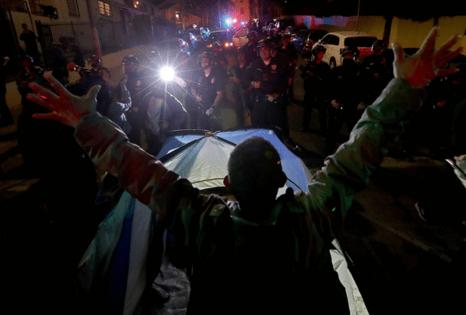LA agrees to pay $500,000 to reporters arrested at 2021 protest in Echo Park
Published in News & Features
The city of Los Angeles has tentatively agreed to pay $500,000 to two Knock LA journalists who claim their constitutional rights were violated when police arrested them while covering a protest four years ago in Echo Park.
Without admitting wrongdoing, the city agreed Monday to settle a lawsuit brought by the reporters, averting a federal civil trial just before jury selection was set to begin. The payout, which still needs approval from the City Council, would cover damages and attorney fees.
Kate McFarlane, an attorney who argued the lawsuit on the pair's behalf, said the outcome felt somewhat hollow. The Los Angeles Police Department's treatment of journalists covering recent protests against the Trump administration shows that the department's culture has not changed despite the litigation, she said.
"We've been seeing journalists in the last few weeks being attacked by LAPD, either by less-lethal weapons or other weapons that LAPD uses to suppress their First Amendment rights to report," McFarlane said.
An LAPD spokesperson declined to comment. The Los Angeles City Attorney's office did not respond to questions.
Another recent lawsuit filed by several news media advocacy groups after dozens were injured by police actions during protests in June led to a court order that bars officers from targeting reporters with hard foam projectiles and other crowd-control munitions.
The Knock LA case stems from the evening of March 25, 2021. Jonathan Peltz and Kathleen Gallagher, both working for the online news nonprofit organization, were reporting on the removal of a homeless encampment from the banks of Echo Park Lake.
Despite "clearly identifying" themselves as reporters and being among other journalists "engaged in similar conduct," Peltz or Gallagher said in their lawsuit that they were arrested and booked after the LAPD declared an unlawful assembly. Under state law, journalists are generally allowed to cover police activity even after members of the public have been ordered to disperse.
Among those detained were Times reporter James Queally, Spectrum News reporter Kate Cagle and L.A. Taco reporter Lexis-Olivier Ray. Unlike the two Knock LA journalists, they were were all released at the scene.
Police, however, bound Peltz and Gallagher by the wrists with plastic zip ties. They also searched the pair and their phones, and confiscated their other belongings before placing them on buses with dozens of other arrested protesters. Both remained in custody for more than four hours.
Peltz, the lawsuit claims, was later taken to the hospital, where medical staff said swelling in his arms and hands was the result of a pinched nerve from being held in the zip ties for so long.
None of the more than 180 people arrested that night were charged.
Attorneys for the two journalists argued that their arrests fit a pattern of LAPD officers "obstructing, targeting, and retaliating against" journalists reporting on their actions — particularly those from smaller, nontraditional media outlets —dating to the 2000 Democratic National Convention.
In a text thread disclosed during the litigation, then-LAPD Chief Michel Moore messaged some of his senior staff members on the night of the Echo Park protest, asking about Queally's detainment. Moore said he had been texted by another Times reporter asking for an explanation.
The thread included former assistant Chiefs Daniel Randolph and Beatrice Girmala as well as deputy Chief Donald Graham, the incident commander that night.
Moore wrote: "Queally posted that he is being arrested. I've asked (the public information officer) to support and assist in any way possible. If Queally is in custody it will garner significant attention due to his status with the LAT."
Graham responded that he would send a spokesperson to the scene to "to identify Queally."
Moore responded that he "[w]ould recommend you hold transports until figured out."
The LAPD later released an after-action report that acknowledged some missteps in dealing with members of the news media, but also defended the police response that night, arguing that officers felt threatened and arrests became necessary.
The department said it stepped up its outreach to local media organizations and provided additional training for new sergeants and detectives for identifying journalists at mass demonstrations.
McFarlane, the attorney for the Knock LA reporters, said their case was less about who the LAPD sees as a member of the media and more as a reflection of the department's ongoing efforts to thwart scrutiny.
"The broader theme is that it's clear that the LAPD is trying to hide their actions, especially when we know their actions are unlawful," she said.
_____
©2025 Los Angeles Times. Visit latimes.com. Distributed by Tribune Content Agency, LLC.







Comments